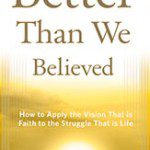Lectionary Reflections for the First Sunday of Christmas – December 29, 2013
Isaiah 63:7-9
Psalm 148
Hebrews 2:10-18
Matthew 2:13-23
Salvation is global as well as individual. This vision is at the heart of the incarnation. The world is saved one person – one creature – at a time. God’s healing initiative is everywhere and joins the healing of nations and planets with the healing of persons. We need a healing environment; our own healing also transforms the environment to support our own and others’ wellbeing.
Isaiah proclaims God’s faithfulness. God is not distant or abstract. God is right here: the divine pathos, as Abraham Joshua Heschel asserts, means that God is concerned about the small as well as large details of our lives. God is intimate, moving through the lives of persons and institutions. We are saved by God’s presence. The adventurous pastor may invite the congregation to consider: Where is God present in saving ways? Where do we experience God’s presence in concrete and intimate ways? These are provocative questions since we seldom experience God’s presence except through the events of our lives. Only occasionally does God present us with a flashing light announcing “I am here.”
Isaiah invites us to be especially attentive to divine movements in ordinary as well as unique events. Isaiah is no deist who places divinity outside of the world to give humankind elbow room for creativity. God already gives us freedom and encourages creativity by working within our relationally and non-coercively. God is with us in the midst of the maelstrom of daily schedules and political realities. God wants us to grow to be God’s companions in saving the world through our efforts.
Psalm 148 joins cosmology and praise. Astounded by our wonderful world, the Psalmist imagines a world of praise. All things reflect divine wisdom and give praise to their creator. Human praise is part of a larger community of praise that includes the many varieties of plant and animal life. The Psalmist invites us to a become mystics who encounter the holy with all our senses. Divine companionship moves through fellow humans, galaxies, and companion animals. Even difficult people and situations mediate the holy, albeit in curious ways. Once again, we need to look beyond appearances and slow down long enough to see the deeper divinely-inspired realities of life. The Psalmist is not advocating pantheism, nor is the Psalmist making an exact correlation between God’s movements and the movements of creatures. When we perceive “a world of praise,” we see unanticipated signs of God’s handiwork in all things. Knowing God is, then, a matter of intention and perception as well as divine initiative and artistry.
The reading from Hebrews joins majesty and universality with intimacy. The One who creates all things moves through each thing, mirroring and responding to our feelings of joy and pain. Dietrich Bonhoeffer once asserted that only a suffering God can save us and the deity envisaged by the author of Hebrews shares our human condition of suffering, limitation, and temptation. Christ saves by relationship and experience of our human lives.
The Gospel reading can be approached on three fronts. Once again, we are introduced to the power of the unconscious to shape our lives. The ancients saw God as moving through the non-rational as well as the rational elements of life, through the dusk as well as the dawn, the darkness as well as the light. Joseph dreams and takes Mary as his bride. The magi dream and decide to return home without reporting to Herod. Joseph dreams of Herod’s threat and the family flees to Egypt.
Dreams reveal divine wisdom. When we listen to God’s whispering in our lives, we are often led on unexpected pathways of personal growth. Synchronicities emerge, guiding us toward new possibilities of adventure; luring us toward safety in threatening situations. Such messages may come to us all the time, but we are seldom sensitive to their wisdom.
The second theme of the Gospel reading involves the realities of immigration. The holy family flees to Egypt, having been warned through a dream that Herod plans to kill the young Jesus. Jesus, Mary, and Joseph are political refugees, dependent on the kindness of strangers. Apart from the welcome of the resident, likely Jewish community, they would not have survived. In the flight of the holy family, we see both grace and initiative – God’s grace mediated through dreams is fulfilled in the actions of Joseph and Mary and the hospitality of those who welcomed them in Egypt.
A third theme, and a difficult one to discuss, is Herod’s slaughter of the innocents. Political powers can choose life or death. Perhaps, Herod’s court took this persecution as a matter of course, the cost of preserving the government and their well-being. Their good fortune was based on violence. While recognizing that some forms of potential violence are implicit in maintaining national security, this passage reminds us that the most vulnerable among us must be protected even when we try to protect ourselves and our nation. Sadly, we wage war with apparently clean hands and a clear conscience against the toddlers and the infants of the world in a variety of ways: cutting food stamps and Head Start programs, maintaining a minimum wage that is unsustainable for families, failing to provide adequate parenting education and job training for parents. Less obvious, and more socially acceptable, is the war against childhood by promoting adult behaviors among children through the media and advertising, and also the neglect of children by parents who place their jobs and personal satisfactions about the well-being of their children.













